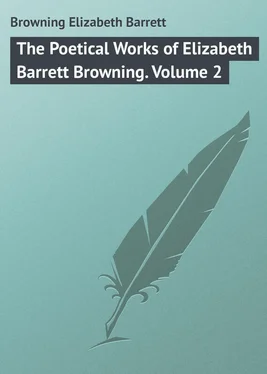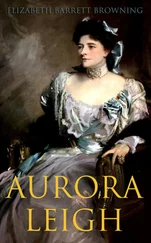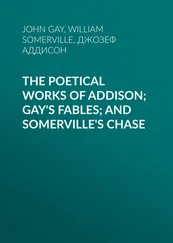Elizabeth Browning - The Poetical Works of Elizabeth Barrett Browning. Volume 2
Здесь есть возможность читать онлайн «Elizabeth Browning - The Poetical Works of Elizabeth Barrett Browning. Volume 2» — ознакомительный отрывок электронной книги совершенно бесплатно, а после прочтения отрывка купить полную версию. В некоторых случаях можно слушать аудио, скачать через торрент в формате fb2 и присутствует краткое содержание. Жанр: Поэзия, foreign_prose, foreign_poetry, на английском языке. Описание произведения, (предисловие) а так же отзывы посетителей доступны на портале библиотеки ЛибКат.
- Название:The Poetical Works of Elizabeth Barrett Browning. Volume 2
- Автор:
- Жанр:
- Год:неизвестен
- ISBN:нет данных
- Рейтинг книги:5 / 5. Голосов: 1
-
Избранное:Добавить в избранное
- Отзывы:
-
Ваша оценка:
- 100
- 1
- 2
- 3
- 4
- 5
The Poetical Works of Elizabeth Barrett Browning. Volume 2: краткое содержание, описание и аннотация
Предлагаем к чтению аннотацию, описание, краткое содержание или предисловие (зависит от того, что написал сам автор книги «The Poetical Works of Elizabeth Barrett Browning. Volume 2»). Если вы не нашли необходимую информацию о книге — напишите в комментариях, мы постараемся отыскать её.
The Poetical Works of Elizabeth Barrett Browning. Volume 2 — читать онлайн ознакомительный отрывок
Ниже представлен текст книги, разбитый по страницам. Система сохранения места последней прочитанной страницы, позволяет с удобством читать онлайн бесплатно книгу «The Poetical Works of Elizabeth Barrett Browning. Volume 2», без необходимости каждый раз заново искать на чём Вы остановились. Поставьте закладку, и сможете в любой момент перейти на страницу, на которой закончили чтение.
Интервал:
Закладка:
"Mother, mother, can I dream
Beneath your earthly trees?
I had a vision and a gleam,
I heard a sound more sweet than these
When rippled by the wind:
Did you see the Dove with wings
Bathed in golden glisterings
From a sunless light behind,
Dropping on me from the sky,
Soft as mother's kiss, until
I seemed to leap and yet was still?
Saw you how His love-large eye
Looked upon me mystic calms,
Till the power of His divine
Vision was indrawn to mine?
"Oh, the dream within the dream!
I saw celestial places even.
Oh, the vistas of high palms
Making finites of delight
Through the heavenly infinite,
Lifting up their green still tops
To the heaven of heaven!
Oh, the sweet life-tree that drops
Shade like light across the river
Glorified in its for-ever
Flowing from the Throne!
Oh, the shining holinesses
Of the thousand, thousand faces
God-sunned by the thronèd One,
And made intense with such a love
That, though I saw them turned above,
Each loving seemed for also me!
And, oh, the Unspeakable, the He,
The manifest in secrecies
Yet of mine own heart partaker
With the overcoming look
Of One who hath been once forsook
And blesseth the forsaker!
Mother, mother, let me go
Toward the Face that looketh so!
Through the mystic wingèd Four
Whose are inward, outward eyes
Dark with light of mysteries
And the restless evermore
'Holy, holy, holy,' – through
The sevenfold Lamps that burn in view
Of cherubim and seraphim, —
Through the four-and-twenty crowned
Stately elders white around,
Suffer me to go to Him!
"Is your wisdom very wise,
Mother, on the narrow earth,
Very happy, very worth
That I should stay to learn?
Are these air-corrupting sighs
Fashioned by unlearnèd breath?
Do the students' lamps that burn
All night, illumine death?
Mother, albeit this be so,
Loose thy prayer and let me go
Where that bright chief angel stands
Apart from all his brother bands,
Too glad for smiling, having bent
In angelic wilderment
O'er the depths of God, and brought
Reeling thence one only thought
To fill his own eternity.
He the teacher is for me —
He can teach what I would know —
Mother, mother, let me go!
"Can your poet make an Eden
No winter will undo,
And light a starry fire while heeding
His hearth's is burning too?
Drown in music the earth's din,
And keep his own wild soul within
The law of his own harmony?
Mother, albeit this be so,
Let me to my heaven go!
A little harp me waits thereby,
A harp whose strings are golden all
And tuned to music spherical,
Hanging on the green life-tree
Where no willows ever be.
Shall I miss that harp of mine?
Mother, no! – the Eye divine
Turned upon it, makes it shine;
And when I touch it, poems sweet
Like separate souls shall fly from it,
Each to the immortal fytte.
We shall all be poets there,
Gazing on the chiefest Fair.
"Love! earth's love! and can we love
Fixedly where all things move?
Can the sinning love each other?
Mother, mother,
I tremble in thy close embrace,
I feel thy tears adown my face,
Thy prayers do keep me out of bliss —
O dreary earthly love!
Loose thy prayer and let me go
To the place which loving is
Yet not sad; and when is given
Escape to thee from this below,
Thou shalt behold me that I wait
For thee beside the happy Gate,
And silence shall be up in heaven
To hear our greeting kiss."
The nurse awakes in the morning sun,
And starts to see beside her bed
The lady with a grandeur spread
Like pathos o'er her face, as one
God-satisfied and earth-undone;
The babe upon her arm was dead:
And the nurse could utter forth no cry, —
She was awed by the calm in the mother's eye.
"Wake, nurse!" the lady said;
" We are waking – he and I —
I, on earth, and he, in sky:
And thou must help me to o'erlay
With garment white this little clay
Which needs no more our lullaby.
"I changed the cruel prayer I made,
And bowed my meekened face, and prayed
That God would do His will; and thus
He did it, nurse! He parted us:
And His sun shows victorious
The dead calm face, – and I am calm,
And Heaven is hearkening a new psalm.
"This earthly noise is too anear,
Too loud, and will not let me hear
The little harp. My death will soon
Make silence."
And a sense of tune,
A satisfied love meanwhile
Which nothing earthly could despoil,
Sang on within her soul.
Oh you,
Earth's tender and impassioned few,
Take courage to entrust your love
To Him so named who guards above
Its ends and shall fulfil!
Breaking the narrow prayers that may
Befit your narrow hearts, away
In His broad, loving will.
THE ROMAUNT OF THE PAGE
A knight of gallant deeds
And a young page at his side,
From the holy war in Palestine
Did slow and thoughtful ride,
As each were a palmer and told for beads
The dews of the eventide.
"O young page," said the knight,
"A noble page art thou!
Thou fearest not to steep in blood
The curls upon thy brow;
And once in the tent, and twice in the fight,
Didst ward me a mortal blow."
"O brave knight," said the page,
"Or ere we hither came,
We talked in tent, we talked in field,
Of the bloody battle-game;
But here, below this greenwood bough,
I cannot speak the same.
"Our troop is far behind,
The woodland calm is new;
Our steeds, with slow grass-muffled hoofs,
Tread deep the shadows through;
And, in my mind, some blessing kind
Is dropping with the dew.
"The woodland calm is pure —
I cannot choose but have
A thought from these, o' the beechen-trees,
Which in our England wave,
And of the little finches fine
Which sang there while in Palestine
The warrior-hilt we drave.
"Methinks, a moment gone,
I heard my mother pray!
I heard, sir knight, the prayer for me
Wherein she passed away;
And I know the heavens are leaning down
To hear what I shall say."
The page spake calm and high,
As of no mean degree;
Perhaps he felt in nature's broad
Full heart, his own was free:
And the knight looked up to his lifted eye,
Then answered smilingly —
"Sir page, I pray your grace!
Certes, I meant not so
To cross your pastoral mood, sir page,
With the crook of the battle-bow;
But a knight may speak of a lady's face,
I ween, in any mood or place,
If the grasses die or grow.
"And this I meant to say —
My lady's face shall shine
As ladies' faces use, to greet
My page from Palestine;
Or, speak she fair or prank she gay,
She is no lady of mine.
Интервал:
Закладка:
Похожие книги на «The Poetical Works of Elizabeth Barrett Browning. Volume 2»
Представляем Вашему вниманию похожие книги на «The Poetical Works of Elizabeth Barrett Browning. Volume 2» списком для выбора. Мы отобрали схожую по названию и смыслу литературу в надежде предоставить читателям больше вариантов отыскать новые, интересные, ещё непрочитанные произведения.
Обсуждение, отзывы о книге «The Poetical Works of Elizabeth Barrett Browning. Volume 2» и просто собственные мнения читателей. Оставьте ваши комментарии, напишите, что Вы думаете о произведении, его смысле или главных героях. Укажите что конкретно понравилось, а что нет, и почему Вы так считаете.












